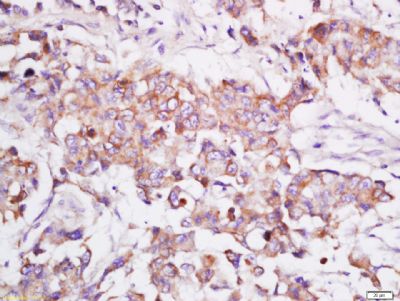GFPT1 Polyclonal Antibody
Purified Rabbit Polyclonal Antibody (Pab)
- SPECIFICATION
- CITATIONS
- PROTOCOLS
- BACKGROUND

Application
| WB, IHC-P, IHC-F, IF, ICC, E |
|---|---|
| Primary Accession | Q06210 |
| Reactivity | Rat, Pig, Dog |
| Host | Rabbit |
| Clonality | Polyclonal |
| Calculated MW | 79 KDa |
| Physical State | Liquid |
| Immunogen | KLH conjugated synthetic peptide derived from human GFPT1 |
| Epitope Specificity | 601-699/699 |
| Isotype | IgG |
| Purity | affinity purified by Protein A |
| Buffer | 0.01M TBS (pH7.4) with 1% BSA, 0.02% Proclin300 and 50% Glycerol. |
| SIMILARITY | Contains 1 glutamine amidotransferase type-2 domain. Contains 2 SIS domains. |
| SUBUNIT | Homotetramer |
| DISEASE | Defects in GFPT1 are the cause of limb-girdle myasthenia with tubular aggregates (LGMTA) [MIM:610542]. A congenital myasthenic syndrome characterized by onset of proximal muscle weakness in the first decade. Individuals with this condition have a recognizable pattern of weakness of shoulder and pelvic girdle muscles, and sparing of ocular or facial muscles. EMG classically shows a decremental response to repeated nerve stimulation, a sign of neuromuscular junction dysfunction. Affected individuals show a favorable response to acetylcholinesterase (AChE) inhibitors. |
| Important Note | This product as supplied is intended for research use only, not for use in human, therapeutic or diagnostic applications. |
| Background Descriptions | Glutamine:fructose-6-phosphate amidotransferase (GFAT1) is the first and rate-limiting enzyme for the entry of glucose into the hexosamine biosynthesis pathway (HBP) in mammals. GFAT1, a member of the N-terminal nucleophile class of amidotransferases, converts fructose-6-phosphate into N-acetylglucosamine-6-phosphate. Hyperglycemia-induced insulin resistance, a condition in which exposure to high concentrations of glucose and insulin results in insulin resistance, may result from increased glucose metabolism through the HBP. Hypergylcemia-induced insulin resistance is a characteristic feature of type 2 diabetes. Consequently, GFAT1 is a potential therapeutic target in the treatment of type 2 diabetes. |
| Gene ID | 2673 |
|---|---|
| Other Names | Glutamine--fructose-6-phosphate aminotransferase [isomerizing] 1, 2.6.1.16, D-fructose-6-phosphate amidotransferase 1, Glutamine:fructose-6-phosphate amidotransferase 1, GFAT 1, GFAT1, Hexosephosphate aminotransferase 1, GFPT1, GFAT, GFPT |
| Target/Specificity | Isoform 1 is predominantly expressed in skeletal muscle. Not expressed in brain. Seems to be selectively expressed in striated muscle. |
| Dilution | WB=1:500-2000,IHC-P=1:100-500,IHC-F=1:100-500,ICC=1:100-500,IF=1:100-500,ELISA=1:5000-10000 |
| Format | 0.01M TBS(pH7.4), 0.09% (W/V) sodium azide and 50% Glyce |
| Storage | Store at -20 ℃ for one year. Avoid repeated freeze/thaw cycles. When reconstituted in sterile pH 7.4 0.01M PBS or diluent of antibody the antibody is stable for at least two weeks at 2-4 ℃. |
| Name | GFPT1 |
|---|---|
| Synonyms | GFAT, GFPT |
| Function | Controls the flux of glucose into the hexosamine pathway. Most likely involved in regulating the availability of precursors for N- and O-linked glycosylation of proteins. Regulates the circadian expression of clock genes BMAL1 and CRY1 (By similarity). Has a role in fine tuning the metabolic fluctuations of cytosolic UDP-GlcNAc and its effects on hyaluronan synthesis that occur during tissue remodeling (PubMed:26887390). |
| Tissue Location | Isoform 1 is predominantly expressed in skeletal muscle. Not expressed in brain. Seems to be selectively expressed in striated muscle. |

Thousands of laboratories across the world have published research that depended on the performance of antibodies from Abcepta to advance their research. Check out links to articles that cite our products in major peer-reviewed journals, organized by research category.
info@abcepta.com, and receive a free "I Love Antibodies" mug.
Provided below are standard protocols that you may find useful for product applications.
If you have used an Abcepta product and would like to share how it has performed, please click on the "Submit Review" button and provide the requested information. Our staff will examine and post your review and contact you if needed.
If you have any additional inquiries please email technical services at tech@abcepta.com.













 Foundational characteristics of cancer include proliferation, angiogenesis, migration, evasion of apoptosis, and cellular immortality. Find key markers for these cellular processes and antibodies to detect them.
Foundational characteristics of cancer include proliferation, angiogenesis, migration, evasion of apoptosis, and cellular immortality. Find key markers for these cellular processes and antibodies to detect them. The SUMOplot™ Analysis Program predicts and scores sumoylation sites in your protein. SUMOylation is a post-translational modification involved in various cellular processes, such as nuclear-cytosolic transport, transcriptional regulation, apoptosis, protein stability, response to stress, and progression through the cell cycle.
The SUMOplot™ Analysis Program predicts and scores sumoylation sites in your protein. SUMOylation is a post-translational modification involved in various cellular processes, such as nuclear-cytosolic transport, transcriptional regulation, apoptosis, protein stability, response to stress, and progression through the cell cycle. The Autophagy Receptor Motif Plotter predicts and scores autophagy receptor binding sites in your protein. Identifying proteins connected to this pathway is critical to understanding the role of autophagy in physiological as well as pathological processes such as development, differentiation, neurodegenerative diseases, stress, infection, and cancer.
The Autophagy Receptor Motif Plotter predicts and scores autophagy receptor binding sites in your protein. Identifying proteins connected to this pathway is critical to understanding the role of autophagy in physiological as well as pathological processes such as development, differentiation, neurodegenerative diseases, stress, infection, and cancer.


